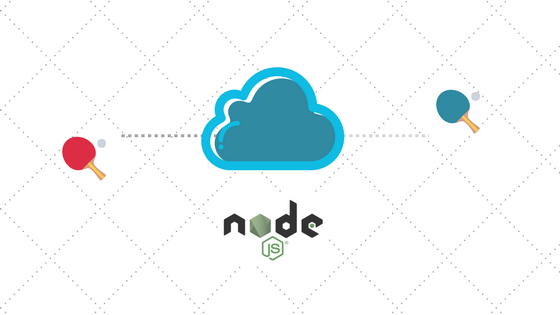node-pong v1.2.5
node-pong

Summary
Every time a developer wants to check if a site/API is up and running, usually a PING is made on a IP and PORT. Sometimes I want to check if my service is up on a determined PORT, or even if my request is going through the firewall/router/switch the way I expect.
So I wanted to have a simple project that I'm able to quick use it for testing purposes.
This is a simple project that provides API endpoints that answers to HTTP requests.
Project Name
The name is simply inspired on the PING-PONG interaction, NOT on the PONG Game!
Install
npm install node-pongUse
Create a Node.js (e.g. nodePongTest.js) file and insert:
let nodePong = require('node-pong');or type this on your terminal:
echo "let nodePong = require('node-pong');">nodePongTest.jsRun
node nodePongTest.jsand you should see the server running:
server running on port 13420Main endpoint
/ping
The main endpoint for all the action on this package is /ping. Every port that is provided to be listened by the server will have this endpoint.
Check response
Now you only have to check if the server is responding using any language/program you want. Example:
curl http://localhost:13420/pingand you should see a response (drum roll)
pongOther response formats
Since version 1.2.0 it's possible to get the response in other format than plain text.
- HTML
- JSON
- XML
HTML
curl -H "Accept: text/html" http://localhost:13420/ping<!DOCTYPE html>
<html lang="en">
<head>
<meta charset="UTF-8">
<title>node-pong response</title>
</head>
<body>
<h1>pong</h1>
</body>
</html>JSON
curl -H "Accept: application/json" http://localhost:13420/ping{
"headers": {
"host": "localhost:13420",
"user-agent": "curl/7.54.0",
"accept": "application/json"
},
"method": "GET",
"url": "/ping",
"body": "{\"answer\": \"pong\"}"
}XML
curl -H "Accept: application/xml" http://localhost:13420/ping<?xml version="1.0" encoding="utf-8" ?>
<answer>pong</answer>Multiple HTTP ACCEPT HEADERS
We want just one kind of response, so IF multiple ACCEPT headers are found, the FIRST one on the following order will be the response:
- JSON
- HTML
- XML
In the case of no header is identified or is incorrect, the plain answer pong will be given.
Additional endpoints
/ports
If you want to check which ports your server is listning to, than use this endpoint.
curl http://localhost:13420/ports["13420"]Configuration file
On version 1.1.0 a configuration file was added. You can copy it from the node_modules/node-pong directory:
cp node_modules/node-pong/node-pong.json .or create it manually:
node-pong.json
{
"_comment": "##########################\n\nThis is the configuration file for node-pong.\n\nports: array of ports for node-pong listen to. If no port is informed, or no node-pong.json file is found, it will listen on the default port 13420.\n\nserverMessage: should be a message that is shown on the console when the server is listening on the desired port, on the form of:\n\nserverMessage: port\n\n##########################\n",
"ports": ["13420"],
"serverMessage": "The server is running on port: "
}_comment: The message you want to show on the console;ports: An array of ports that the server must listen to.- You can specify one by one or a range of ports;
- Range will not check if the
startPortis bigger than theendPort, so you must supply the range in the correct order. E.g.:- correct: 10-20;
- wrong: 20-10;
- NaN will just throw a "
-> not a valid port" message on the console, but will not throw any error or interrupt other listening ports;
serverMessage: The message shown in the console when the server is started. It'll be one for each listened port;
NOTE1: If no configuration file is found or if the name is not correct (node-pong.json), than the server will be started just like on version 1.0.0, listening on the default port 13420.
NOTE2: As of one of my goals it to have the fewer dependencies possible, I opted for use the configuration file in json format, not on YAML or any other.
Goals
Provide a simple API able to answer to HTTP requests, enabling our project to:
- Provide a default API endpoint "/ping" on a predefined default port;
- Respond to ping requests on a default port;
- Respond with a default answer "PONG";
- Provide different type of responses other than the default plain text (HTML, JSON, XML)
- Fewer dependencies as possible or no dependencies at all
- Implement in-memory list of ports, with or without file persistence, for dynamic project configuration;
- OPTIONAL: respond to ping requests on several ports;
- OPTIONAL: respond with a customized answer on the default port;
- OPTIONAL: respond with a customized answer on several different ports;
TODO
- Implement every OPTIONAL goal described above;
- Create tests using Mocha or another framework;
- Implement a continuous delivery process;
Release notes
1.2.5
- Added a simple Mocha test for testing
/pingon the default port. Test every response type (plain, json, html and xml); - Also test the
/portsendpoint; - fixed a bug when no header for "Accept" was defined, the request crashed the server;
- Added close() function to close server;
- jumped to this version number because of my npm not publishing correctly. Ignore versions 1.2.1 through 1.2.4.
1.2.0
- Added "/ports" endpoint to check which ports the server is listening to;
- Response in multiple formats based on HTTP headers (html, json, xml)
1.1.1
- Fixed loading
node-pong.jsonfrom current dir(./), now usingprocess.cwd(); - Goals updated - added dynamic port configuration wish;
- Added more keywords for the package;
1.1.0
- Added the ability of listening on multiple ports;
- Added the ability of custom "server running" message;
1.0.1
- Fixing README and deploy error;
1.0.0
- It's the MVP for this package;
- Simplest implementation ever;
- no dependencies;
- no logs;
- no tests;
- no parameters for start listening on a different port;